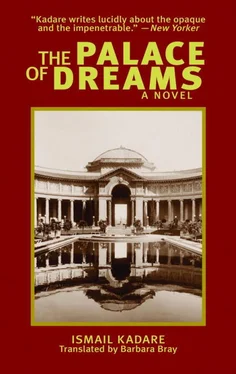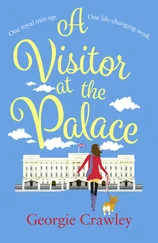In the end the bell did ring. Mark-Alem hastily collected his papers. There was a din as every drawer in the room was opened and every file stowed away. Mark-Alem locked the drawer in his own desk. Although he was among the first to leave the room, it took him a good quarter of an hour to get right out of the building.
It was cold out in the street. The staff poured out of the doorways in groups, then dispersed in different directions. As they did every evening, a crowd of onlookers watched from the pavement opposite as the people who worked in the Palace of Dreams emerged. Out of all the great State institutions, not excluding the Palace of the Sheikh-ul-Islam and the offices of the Grand Vizier, the Tabir Sarrail was the only one that aroused public curiosity. So much so that almost no day went by without hundreds of people gathering to stand and wait for the staff to go home. Silently, with their collars turned up against the cold, they observed the mysterious officials who were entrusted with the State’s most mysterious work. They gazed at them intently, as if trying to read in their faces the dreams it was their task to decipher. The crowd didn’t go away until the heavy doors of the great Palace had creaked shut.
Mark-Alem began to hurry. The streetlamps weren’t lighted yet, but they would be by the time he reached the street where he lived. Ever since he’d started working in the Tabir Sarrail, darkness had made him feel apprehensive.
The streets were full of pedestrians, and every so often carriages dashed by with drawn curtains. Mark-Alem thought they must be taking beautiful courtesans to secret rendezvous, and heaved a sigh.
When he got to his own street the lamps had indeed been lighted. It was a quiet residential street; half of the houses were surrounded by heavy wrought-iron railings. The chestnut sellers were getting ready to go home. Some had already packed away their chestnuts, paper cones, and coal, and looked as though they were waiting for their braziers and the wire sieves on top to cool down. The policeman on duty saluted Mark-Alem respectfully. A neighbor, Betch Bey, a former army officer, came out of the corner café, dead drunk, with a couple of friends. He whispered something to the others when he saw Mark-Alem, who as he passed them sensed their eyes resting on him with a mixture of curiosity and fear. He walked on faster. He could see from a distance that the lights were on in the ground floor and second floor of the house. There must be visitors, he thought, but couldn’t repress a shudder. As he got nearer he could see a carriage drawn up outside the gate with the letter Q for Quprili carved on both doors. But instead of reassuring him, this only added to his uneasiness.
Loke, the old servant, came and opened the gate for him.
“What’s going on?” he said, nodding toward the lighted windows upstairs.
“Your uncles have come to see you.”
“Has anything happened?”
“No. They’re just visiting.”
Mark-Alem sighed with relief.
What’s the matter with me? he wondered as he went through the courtyard to the front door. Often, coming home very late, he’d felt worried when he saw lights in the windows, but he’d never been as troubled as this evening. It must be my new job, he thought.
“Two friends of yours came and asked for you this afternoon,” said Loke, who was following behind. “They said to tell you to meet them tomorrow or the day after at the klab or klob or whatever you call it—”
“Club.”
“That’s it! The club!”
“If they come back, tell them I’m busy and can’t go.”
“All right,” said Loke.
There was a pleasant smell of cooking in the hall. Mark-Alem paused for a moment outside the drawing room, without quite knowing why. Finally he opened the door and went in. The great room, with its floor covered with rugs, was full of the familiar scents of a wood fire. Two of his three maternal uncles were there—the eldest, who had his wife with him, and the youngest—also two of his cousins, both deputy ministers. Mark-Alem greeted them all in turn.
“You look tired,” said the older of the two uncles.
Mark-Alem shrugged, as if to say: “I can’t help it—it’s the work.…” He guessed at once that they’d come to talk about him and his new job. He looked at his mother, who was sitting with her legs drawn up beside her near one of the big copper braziers. She gave him a faint smile, and at once his anxiety vanished. He sat down at one end of a divan and hoped he’d soon stop being the center of attention. He didn’t have to wait very long.
The older uncle took up a story he’d apparently been telling before Mark-Alem came in. He was the governor of one of the remotest regions in the Empire, and every time he came to the capital on business he brought back a lot of extremely rough stories which always seemed exactly the same to Mark-Alem as those he’d told the last time. His wife, a sickly-looking woman with a sullen expression, listened intently to all her husband said, occasionally glancing at the others as if to say, “You see the sort of place we have to live in!” She never stopped complaining about the climate there and about how hard her husband had to work; beneath all this you could detect a muted but permanent resentment against her brother-in-law, the middle one of the three uncles—the Vizier, as everyone called him now. He wasn’t present this evening. As foreign minister he was the highest-ranking member of the whole Quprili family, and the governor’s wife bore him a secret grudge for not doing enough to get his brother recalled to the capital.
The youngest uncle listened to the eldest with an absent smile. While Mark-Alem saw the older of the two men as a bronze figure corroded by the coarseness and fanaticism of provincial life, his liking for the younger increased daily. He had fair hair, and with his light-colored eyes, reddish mustache, and half-German, half-Albanian name, Kurt, he was regarded as the wild rose of the Quprili tribe. Unlike his brothers he had never stuck to any important job. He’d always gone in for strange occupations as brief as they were odd: At one time he’d devote himself to oceanography, at another to architecture, and lately it had been music. He was a confirmed bachelor, went riding with the Austrian consul’s son, and was said to carry on a sentimental correspondence with several mysterious ladies. In short, he led a life that was as pleasant as it was frivolous, the absolute opposite of the lives led by his brothers. Mark-Alem might have thought of imitating him, but he knew he was incapable of it. Now, listening quite serenely to his uncles, he thought of the carriage that had brought them here, drawn up outside his house. Every time he saw the vehicle it filled him with a kind of fearful joy, because it had always been the bearer of news, whether good or bad.
The Palace—as among themselves all the family called the residence of the most eminent of the Quprilis—was equipped with several carriages, all identical. But for Mark-Alem they had all merged into one: the carriage, sometimes of good and sometimes of evil omen, with Q carved on its doors, which might convey either rainbows or thunderclouds from the main to the other family residences. On several occasions it had been suggested that the Q should be replaced by a K—in accordance with the official Ottoman spelling of their patronymic: Köprülü —but the family always refused, and continued to spell its name in the Albanian fashion.
“So you’re working in the Tabir Sarrail?” said the elder of the two uncles, having at last finished speechifying. “You finally made up your mind?”
“We all decided together,” said Mark-Alem’s mother.
“You did the right thing,” said the uncle. “It’s an honorable position, an important job. My best wishes for your success!?
Читать дальше












